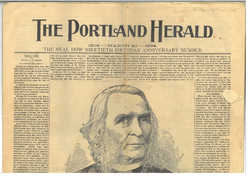Colonel Neal Dow, ca. 1865
Published by John Russell
Hand-colored lithograph
Collections of Maine Historical Society; purchased with funds from the Edward Foley Memorial Fund
1997.245
When Civil War came, the Napoleon of Temperance took his campaign to the front by forming his own dry regiment, the 13th Maine. The Colonel was eventually taken prisoner. On July 4, 1863, Capt. John Franklin of Bangor wrote of Dow's capture, "A small squad of rebels gobbled him up and took him to the confederacy, where I hope he will stay the remainder of his life."

Neal Dow, Portland, ca. 1885
Maine Historical Society
Neal Dow (1804-1897), ca. 1880
Collections of Maine Historical Society; gift of Nathan Goold
The Portland Herald, March 20, 1894
Collections of Maine Historical Society
Pamphlet 2541
Ramrod Jubilee, Portland, 1854
Broadside 487
Collections of Maine Historical Society; gift of William B. Jordan, Jr., 1998

Portland City Hall, Market Square, ca. 1880
Maine Historical Society
City Hall in Market Square, Portland, ca. 1880
Collections of Maine Historical Society
Although this photograph was taken after the Rum Riot of 1855, the building had changed little after city government had moved to an elegant new Hall. The sign for "Moxie" shows the development and rising demand for soft drinks and their evolution from cure-all tonics.
Neal Dow Commemorative Goblet, 1856
Gorham Co., Providence
Silver with gold wash
Collections of Maine Historical Society; purchased in memory of Dr. William Monkhouse, 1988
Neal Dow's followers were passionate in their support of the man and his program. In his lifetime a number of gifts, marking his efforts, came his way. This goblet, one of a set of four, was presented to Dow by the Ladies Temperance Band of Portland in 1856.
"The liquor traffic is a grater curse to the nation and a greater source of misery, wretchedness and pain to the people than are all other sources of evil combined. All crimes united from petty theiving to burglary, house burning, murder, piracy and rebellion inflict far less evil to the country than the vast armies of rum shops now established by law up and down through our territory which live and flourish only by spreading everywhere among the people pauperism, poverty, brutality, degradation and crime." - Neal Dow, Speech on his 93rd birthday, March 18, 1897
Great Moral Ideas in the State Treasury, ca. 1860
Newspaper clipping
Collections of Maine Historical Society
Coll. 951, vol. 53
Elder Benjamin D. Peck, a close associate of Neal Dow in the temperance crusade, served as State Treasurer from 1857 to 1860. During this time, he borrowed and loaned state money to private individuals including Dow. Peck went to jail, but Dow's involvement in the scandal and perceived cover up was a personal setback and a major blow to the Maine Law movement.
Celebration!, Portland, 1851
Broadside 486
Collections of Maine Historical Society; gift of William B. Jordan, Jr., 1998
This spoof of Mayor Deal Now appeared shortly after the passage of the Maine Law and reflects the spirit of a number of Mainers opposed to the dry ideal.
Review of the Testimony, Portland, 1855
Collections of Maine Historical Society
QJ Mt P837.21a
The Portland Rum Riot began on June 2, 1855 when rumors spread that Mayor Neal Dow was keeping his own supply of liquor in City Hall. Menacing crowds challenged the police and Dow brought up the militia. The building was attacked by the mob and after a warning, the militia fired into the crowd, wounding several and killing John Robbins of Deer Isle. The incident brought calls to hang Dow, but subsequent inquiries did not lead to a trial. Dow's hopes for a political career, however, began to dim.







